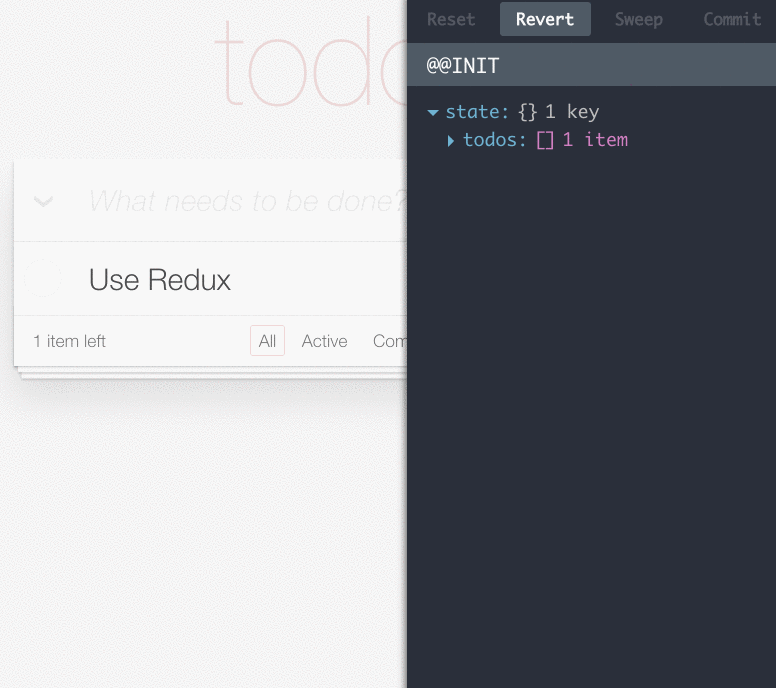| .. | ||
| examples | ||
| src | ||
| test | ||
| .babelrc | ||
| .eslintignore | ||
| .eslintrc.js | ||
| CHANGELOG.md | ||
| jest.config.js | ||
| LICENSE.md | ||
| package.json | ||
| README.md | ||
| tsconfig.json | ||
Redux DevTools
A live-editing time travel environment for Redux.
See Dan's React Europe talk demoing it!
Note that the implemention in this repository is different from Redux DevTools Extension. Please refer to the latter for browser extension.
Table of Contents
Features
- Lets you inspect every state and action payload
- Lets you go back in time by “cancelling” actions
- If you change the reducer code, each “staged” action will be re-evaluated
- If the reducers throw, you will see during which action this happened, and what the error was
- With
persistState()store enhancer, you can persist debug sessions across page reloads
Overview
Redux DevTools is a development time package that provides power-ups for your Redux development workflow. Be careful to strip its code in production (see walkthrough for instructions)! To use Redux DevTools, you need to choose a “monitor”—a React component that will serve as a UI for the DevTools. Different tasks and workflows require different UIs, so Redux DevTools is built to be flexible in this regard. We recommend using LogMonitor for inspecting the state and time travel, and wrap it in a DockMonitor to quickly move it across the screen. That said, when you’re comfortable rolling up your own setup, feel free to do this, and share it with us.
If you came here looking for what do the “Reset”, “Revert”, “Sweep” or “Commit” buttons do, check out the LogMonitor documentation.
Browser Extension
If you don’t want to bother with installing Redux DevTools and integrating it into your project, consider using Redux DevTools Extension for Chrome and Firefox. It provides access to the most popular monitors, is easy to configure to filter actions, and doesn’t require installing any packages.
Setup Instructions
Read the installation walkthrough for integration instructions and usage examples (<DevTools> component, DevTools.instrument(), exclude from production builds, gotchas).
Running Examples
Clone the project:
git clone https://github.com/reduxjs/redux-devtools.git
cd redux-devtools/packages/redux-devtools
Run npm install in the package folder:
npm install
Now you can open an example folder and run npm install there:
cd examples/counter # or examples/todomvc
npm install
Finally, run the development server and open the page:
npm start
open http://localhost:3000
Try clicking on actions in the log, or changing some code inside the reducers. You should see the action log re-evaluate the state on every code change.
Also try opening http://localhost:3000/?debug_session=123, click around, and then refresh. You should see that all actions have been restored from the local storage.
Custom Monitors
DevTools accepts monitor components so you can build a completely custom UI. LogMonitor and DockMonitor are just examples of what is possible.
I challenge you to build a custom monitor for Redux DevTools!
Some crazy ideas for custom monitors:
- A slider that lets you jump between computed states just by dragging it
- An in-app layer that shows the last N states right in the app (e.g. for animation)
- A time machine like interface where the last N states of your app reside on different Z layers
- Feel free to come up with and implement your own! Check
LogMonitorpropTypesto see what you can do.
In fact some of these are implemented already:
Slider Monitor
Inspector
Diff Monitor
Filterable Log Monitor
Chart Monitor
Filter Actions
(Does not have a UI but can wrap any other monitor)

Dispatch
Redux Usage Report
Keep them coming!
Create a PR to add your custom monitor.
License
MIT









